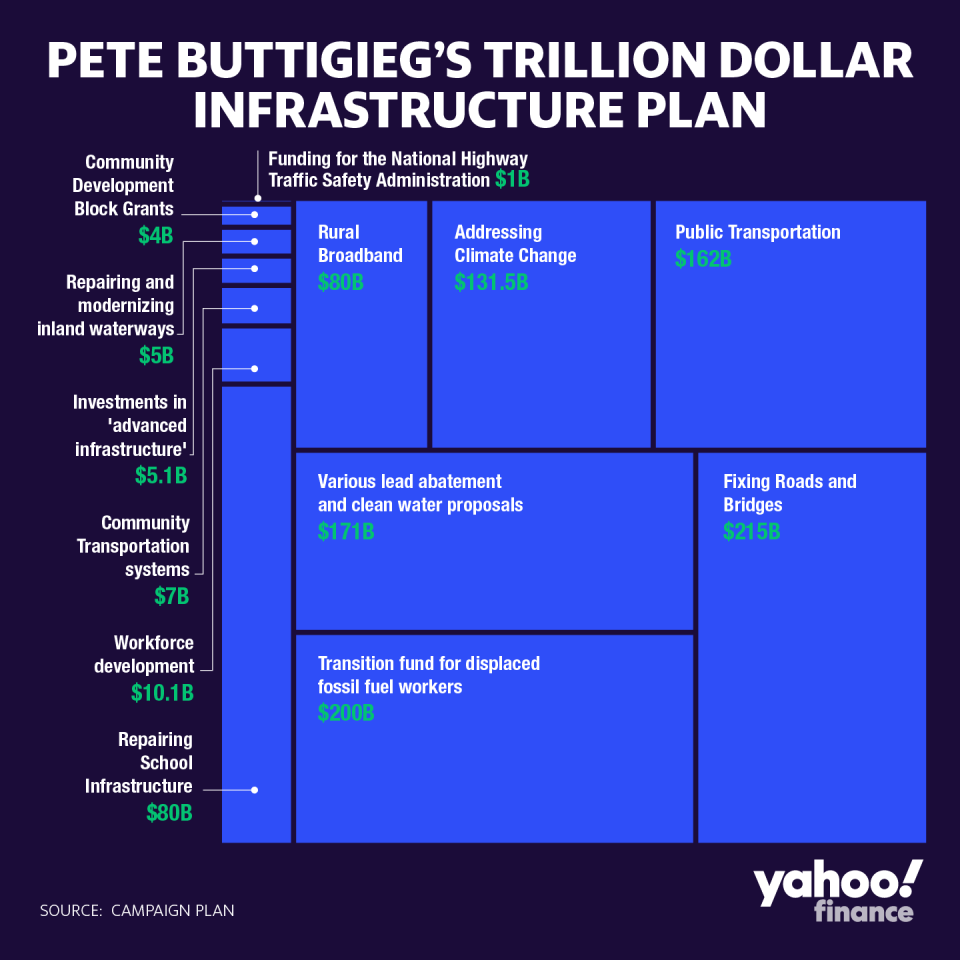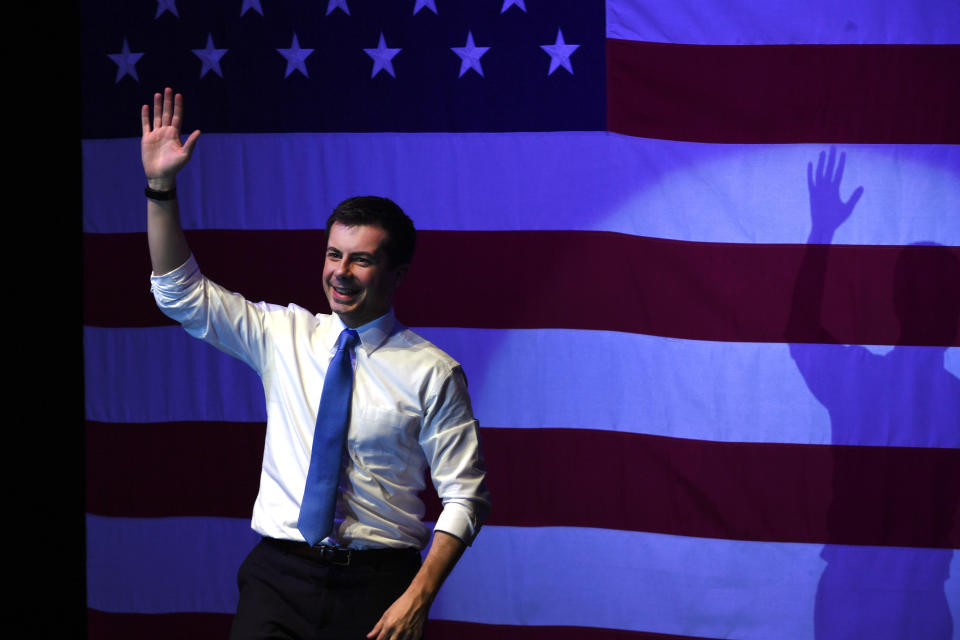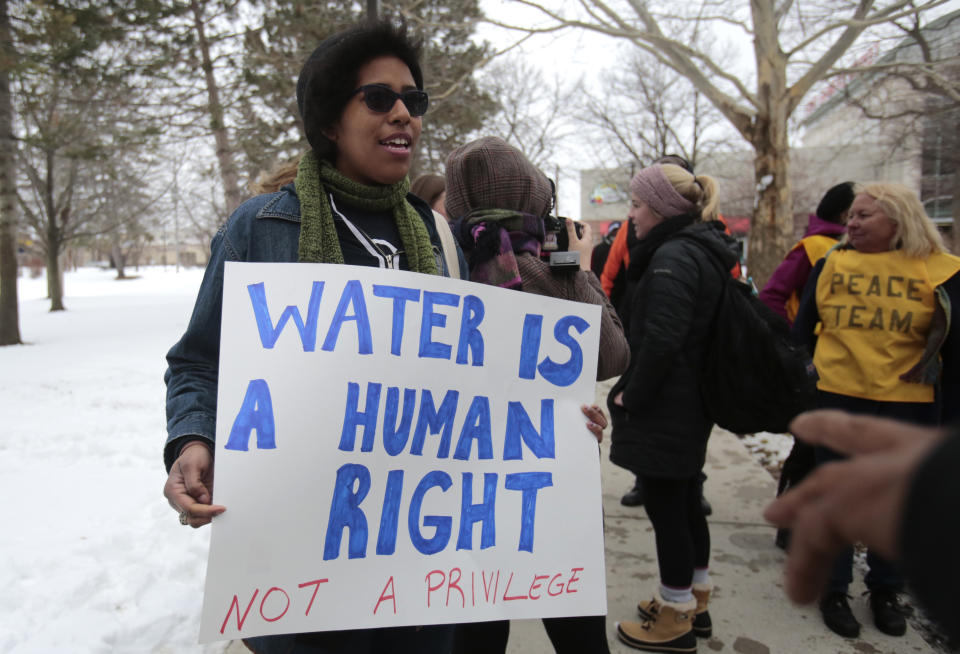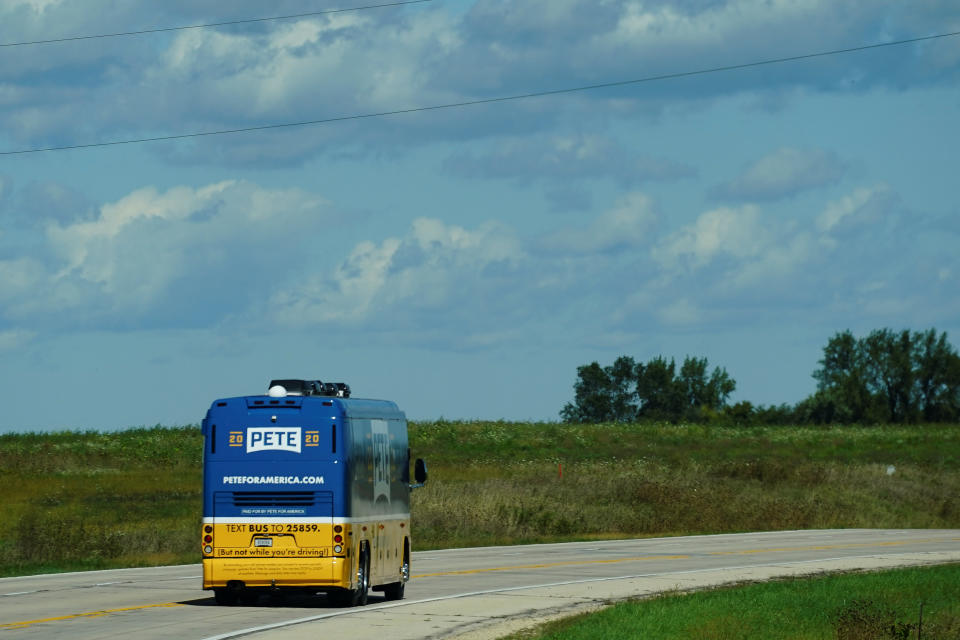Pete Buttigieg’s new infrastructure plan covers everything from lead pipes to rural internet
On Friday, Democratic presidential candidate Pete Buttigieg released an infrastructure plan that he says will create millions of new jobs but comes with a price tag of over $1 trillion.
The plan takes on everything from repairing roads to ensuring clean drinking water to creating rural broadband networks and even repairing public schools.
”I think this is a big bold plan that takes a broad view of infrastructure,” says Aaron Klein, the policy director of the Center on Regulation and Markets at the Brookings Institution. He adds that “there is a realistic chance for a president who prioritizes infrastructure to get something done.”

The plan includes some details about how the mayor would pay for all of these proposals. A campaign spokesperson tells Yahoo Finance that measures like reforming the capital gains tax, repealing the Trump tax cuts, and reforming the estate tax would help pay for some these ideas. The plan also discusses a “new and sustainable user fee-based system” that could potentially replace the gas tax.
Mayor Pete’s plan adds to a robust debate in the Democratic field that has featured a variety of ways to tackle an infrastructure problem. In Washington, there is bipartisan support for action, but little agreement on what measures to take or how to pay for it. Elizabeth Warren includes infrastructure under the umbrella of her green new deal plan. Former Vice President Joe Biden has a $1.3 trillion infrastructure plan that his campaign says will bolster the middle class.

In 2016, then-candidate Donald Trump promised to go ‘bigly’ on infrastructure. In office, he even briefly agreed to a $2 trillion infrastructure plan with Democrats that, before it fell apart, had no funding plans beyond bigger deficits.
By comparison, the former South Bend Mayor’s plan has a smaller price tag and he emphasizes throughout how he would “make spending decisions that deliver the best value for local communities.”
A focus on clean water
Before it turns to traditional infrastructure concerns like roads, Mayor Pete’s plan focuses on clean water. The plan proposes a $100 billion fund that local communities could tap into “to address lead in water, paint, and soil.”
All told, Buttigieg proposes around $170 billion in new spending on a variety of initiatives related to lead and clean water.
The plan takes the position that “it is the government’s role and responsibility to have safe access to drinking water” says Klein, adding that Buttigieg is proposing solutions that the water crisis in Flint, Michigan brought to the forefront.
Flint has been a national story since 2014 when changes in the water supply allowed lead to leech into the city's drinking water. The fallout from the scandal has led to charges against former Flint government officials. National politicians took notice with a Democratic presidential primary debate held in the city in 2016 (and a GOP primary debate held nearby).

Part of Buttigieg’s plan is a promise that “every American has access to clean drinking water.”
A range of other initiatives
The plan offers billions more on ideas ranging from a transition fund for displaced fossil fuel workers to Community Development Block Grants to repairing K-12 school infrastructure and rural broadband.
The biggest chunk is devoted to initiatives around repairing roads and bridges and revitalizing public transportation around the country. The plan would infuse cash into cities for upgrades to existing public transportation systems and create another fund to encourage new public transportation options in rural communities.

Much of the money would come in the form of new federal funds that localities would then access and decide exactly how to spend, under conditions set by Washington DC.
“Under my administration, local governments will finally have a partner in Washington” said Buttigieg in a statement on the plan’s release. “As a former mayor, I know that priority-based budgets made locally are better than budget-based priorities set in Washington.”
All told, the campaign estimates that his range of initiatives will create 6 million “well-paying jobs with strong labor protections.” A Buttigieg administration would enforce the labor standards through the agency review process and through rules attached to the various funds it would create. The plan also allocates $10 billion to fund skill development at two- and four-year colleges and another $100 million to help job seekers from underrepresented communities.
Ben Werschkul is the DC producer for Yahoo Finance.
Read more:
Pete Buttigieg has a big new plan to shake up the retirement system
Here's Michael Bloomberg's new 'All-In' economic agenda
New Warren plan takes aim at bankruptcy (and Biden)
Follow Yahoo Finance on Twitter, Facebook, Instagram, Flipboard, LinkedIn, YouTube, and reddit.

 Yahoo Finance
Yahoo Finance 
